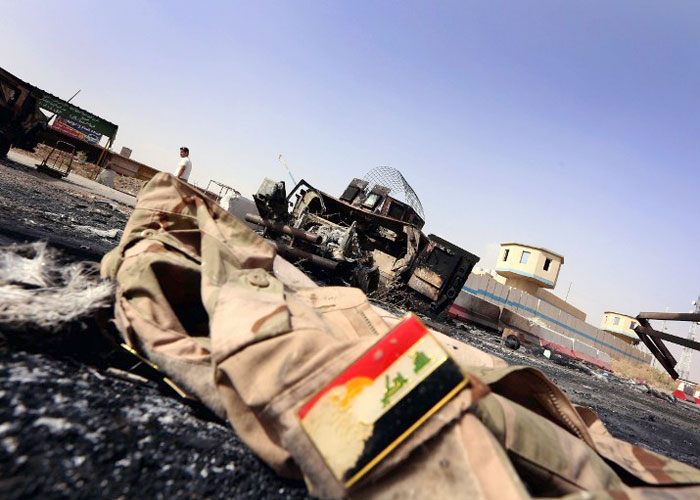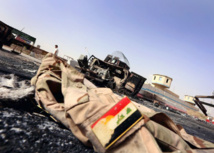The report names a number of top officials, including ex-premier and now vice president Nuri al-Maliki, as responsible for the fall of the capital of Nineveh province.
"Those who were informed about the security situation in the province knew... that this situation would surely happen," said the report, the product of a parliamentary inquiry that has been referred to the judiciary for possible legal action.
"All the information clearly indicated that," according to the report, which has not been publicly released. "The only surprise was the speed with which the military units collapsed."
"The poor performance of the security commanders who led the battle... destroyed the last hope for the city's resistance. These commanders made a number of grave mistakes that accelerated the security collapse."
Key intelligence information pointing to the impending attack was apparently ignored, including reports in May 2014 indicating an attack on Mosul would take place the following month.
Of even greater importance was information obtained from a captured IS commander who said the attack would begin on the morning of June 6, identified the planned line of advance into Mosul, and revealed the locations, strengths and armaments of sleeper cells inside the city.
- Battle lost before it began -
The IS assault -- which eventually overran a third of Iraq -- began as scheduled.
One of the first engagements started after a policeman contacted his commander to report a column of vehicles, the report said.
The commander said he believed they were friendly, but upon being told the column, which was led by two Humvees, was made up of civilians and included pickup trucks mounted with machineguns, ordered the policeman to open fire.
In many ways, the battle for Mosul was lost well before the first shots were fired.
IS was deeply entrenched and well-funded in Nineveh, running a highly-successful, mafia-like racketeering effort that brought in an estimated $11 million per month, extorting money from doctors, generator owners and even a vegetable market, the report said.
And Maliki and others made decisions that fundamentally weakened the army, including in Nineveh.
He selected "incompetent leaders and commanders under whose leadership all types of corruption were practised," the report said.
Commanders did not hold security forces members to account for corruption, "widening the gap between the people and the security services."
Maliki also lacked "commitment to building the capabilities of the new Iraqi army."
Units were formed "without concern for basic training and quality armament and focusing on numbers in the overall force of the army at the expense of competence and training and quality," the report found.
Iraqi ground forces commander General Ali Ghaidan meanwhile failed to resupply units in Mosul with soldiers and equipment, and withdrew units from Nineveh for deployment in other provinces, the report said.
- Burning Humvees, missing soldiers -
Most of the security forces units in Nineveh were only at 50-60 percent strength, and relations between them and citizens were poor.
And deputy army chief of staff General Aboud Qanbar "did not take the necessary measures regarding the ongoing security failures that preceded the fall of Mosul."
The experience of Staff Brigadier General Fadhel Jawwad Ali, who arrived on June 8 to take up command of the 2nd Division, illustrates the dire state of security forces in Mosul before its fall.
He found checkpoints lightly manned, vehicles that did not work and one unit that should have numbered 500 men only staffed by 71.
When Ali asked to see a defensive line, officers pointed out a street with two burning Humvees and bodies lying on the ground.
Qanbar's bungling continued once Maliki dispatched him and Ghaidan to Mosul to address the crisis.
According to the report, Qanbar misunderstood the situation in Mosul, and was responsible for "great confusion that hit the command of the battle".
The night before the IS takeover, he withdrew from western Mosul with "more than 30 armoured vehicles carrying people, greatly harming the morale of the fighters."
IS used the withdrawal "to spread news of the escape of the leaders."
Earlier on June 9, Qanbar had ordered an operation to retake areas of west Mosul be planned for the following day.
"It was not implemented because the operations ended with the fall of Mosul," the report said.
------------------------------------------------------------------------------------------------------------------------
"Those who were informed about the security situation in the province knew... that this situation would surely happen," said the report, the product of a parliamentary inquiry that has been referred to the judiciary for possible legal action.
"All the information clearly indicated that," according to the report, which has not been publicly released. "The only surprise was the speed with which the military units collapsed."
"The poor performance of the security commanders who led the battle... destroyed the last hope for the city's resistance. These commanders made a number of grave mistakes that accelerated the security collapse."
Key intelligence information pointing to the impending attack was apparently ignored, including reports in May 2014 indicating an attack on Mosul would take place the following month.
Of even greater importance was information obtained from a captured IS commander who said the attack would begin on the morning of June 6, identified the planned line of advance into Mosul, and revealed the locations, strengths and armaments of sleeper cells inside the city.
- Battle lost before it began -
The IS assault -- which eventually overran a third of Iraq -- began as scheduled.
One of the first engagements started after a policeman contacted his commander to report a column of vehicles, the report said.
The commander said he believed they were friendly, but upon being told the column, which was led by two Humvees, was made up of civilians and included pickup trucks mounted with machineguns, ordered the policeman to open fire.
In many ways, the battle for Mosul was lost well before the first shots were fired.
IS was deeply entrenched and well-funded in Nineveh, running a highly-successful, mafia-like racketeering effort that brought in an estimated $11 million per month, extorting money from doctors, generator owners and even a vegetable market, the report said.
And Maliki and others made decisions that fundamentally weakened the army, including in Nineveh.
He selected "incompetent leaders and commanders under whose leadership all types of corruption were practised," the report said.
Commanders did not hold security forces members to account for corruption, "widening the gap between the people and the security services."
Maliki also lacked "commitment to building the capabilities of the new Iraqi army."
Units were formed "without concern for basic training and quality armament and focusing on numbers in the overall force of the army at the expense of competence and training and quality," the report found.
Iraqi ground forces commander General Ali Ghaidan meanwhile failed to resupply units in Mosul with soldiers and equipment, and withdrew units from Nineveh for deployment in other provinces, the report said.
- Burning Humvees, missing soldiers -
Most of the security forces units in Nineveh were only at 50-60 percent strength, and relations between them and citizens were poor.
And deputy army chief of staff General Aboud Qanbar "did not take the necessary measures regarding the ongoing security failures that preceded the fall of Mosul."
The experience of Staff Brigadier General Fadhel Jawwad Ali, who arrived on June 8 to take up command of the 2nd Division, illustrates the dire state of security forces in Mosul before its fall.
He found checkpoints lightly manned, vehicles that did not work and one unit that should have numbered 500 men only staffed by 71.
When Ali asked to see a defensive line, officers pointed out a street with two burning Humvees and bodies lying on the ground.
Qanbar's bungling continued once Maliki dispatched him and Ghaidan to Mosul to address the crisis.
According to the report, Qanbar misunderstood the situation in Mosul, and was responsible for "great confusion that hit the command of the battle".
The night before the IS takeover, he withdrew from western Mosul with "more than 30 armoured vehicles carrying people, greatly harming the morale of the fighters."
IS used the withdrawal "to spread news of the escape of the leaders."
Earlier on June 9, Qanbar had ordered an operation to retake areas of west Mosul be planned for the following day.
"It was not implemented because the operations ended with the fall of Mosul," the report said.
------------------------------------------------------------------------------------------------------------------------









 Home
Home Politics
Politics











